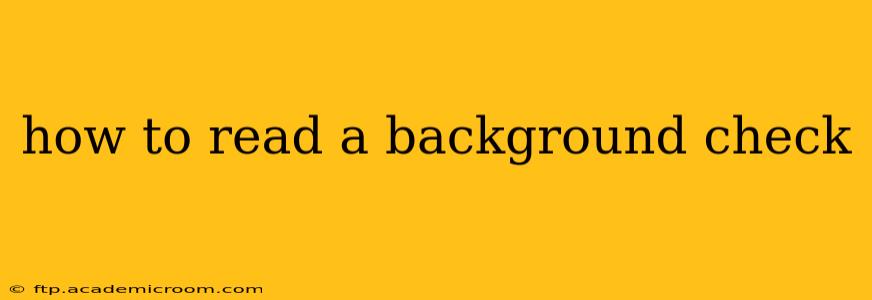How to Read a Background Check: A Comprehensive Guide
Understanding the information contained within a background check can be daunting. This comprehensive guide will walk you through the different sections, common terms, and potential interpretations, empowering you to confidently navigate this crucial document. Whether you're reviewing your own background check or one provided for employment purposes, this guide will help you understand what you're looking at.
What Information is Typically Included in a Background Check?
A typical background check encompasses several key areas, providing a snapshot of an individual's past. These commonly include:
-
Personal Information: This section verifies basic details like full name, date of birth, social security number, current and previous addresses, and sometimes even aliases. Inconsistencies here can raise flags.
-
Criminal History: This is often the most scrutinized section. It details any arrests, charges, convictions, and sentences for criminal offenses. Note that an arrest doesn't equate to guilt; a conviction does. The details usually include the date, location, charges, disposition (e.g., dismissed, convicted), and any associated penalties.
-
Employment History: This section verifies past employment, including dates of employment, job titles, and employer contact information. Discrepancies between what's stated and what employers confirm can be problematic.
-
Education History: Similar to employment history, this section verifies educational credentials, including degrees earned, institutions attended, and dates of attendance.
-
Credit History (Often Separate): While not always included in every background check, credit reports provide a summary of an individual's creditworthiness, including credit scores, payment history, and outstanding debts. This is often used in specific employment settings.
-
Driving Record (Sometimes Included): This section details driving history, including traffic violations, accidents, and license suspensions or revocations.
How to Interpret the Information:
Understanding the Severity of Offenses: The impact of a criminal record varies significantly based on the nature of the offense, the date of the offense, and the jurisdiction. Minor offenses from many years ago might have less weight than recent serious crimes. Always consider the context.
Context is Crucial: A single blemish on an otherwise clean record might not be disqualifying. The overall picture matters. Consider the length of time since the incident, any rehabilitative efforts, and the relevance of the offense to the job in question.
What to Look for and Questions to Ask:
-
Inconsistencies: Are there any discrepancies between the information provided and what you remember or expect? Report any such errors immediately.
-
Missing Information: Are there gaps in employment or education history that require clarification?
-
Explanations for Negative Information: If there are negative items, do you have reasonable explanations that mitigate their significance?
What Does "Dismissed" Mean?
A dismissed charge means the prosecution decided not to pursue the case, often due to insufficient evidence. While it doesn't erase the arrest, it typically carries less weight than a conviction.
What About Expunged or Sealed Records?
Expunged or sealed records are typically not visible on background checks, meaning they've been legally removed from public view.
Can I Dispute Inaccurate Information?
Absolutely. If you find inaccuracies in your background check, you have the right to dispute them with the reporting agency. Gather supporting documentation to support your claims.
The Importance of Professional Interpretation:
While this guide provides valuable information, it's crucial to remember that background checks are complex legal documents. For critical decisions based on the content of a background check, consulting with a legal professional or HR expert is highly recommended. They can offer informed interpretations and guidance.
This guide provides a foundational understanding of how to read a background check. However, the specifics can vary depending on the provider and the purpose of the check. Always review the report carefully and seek professional help when needed.
